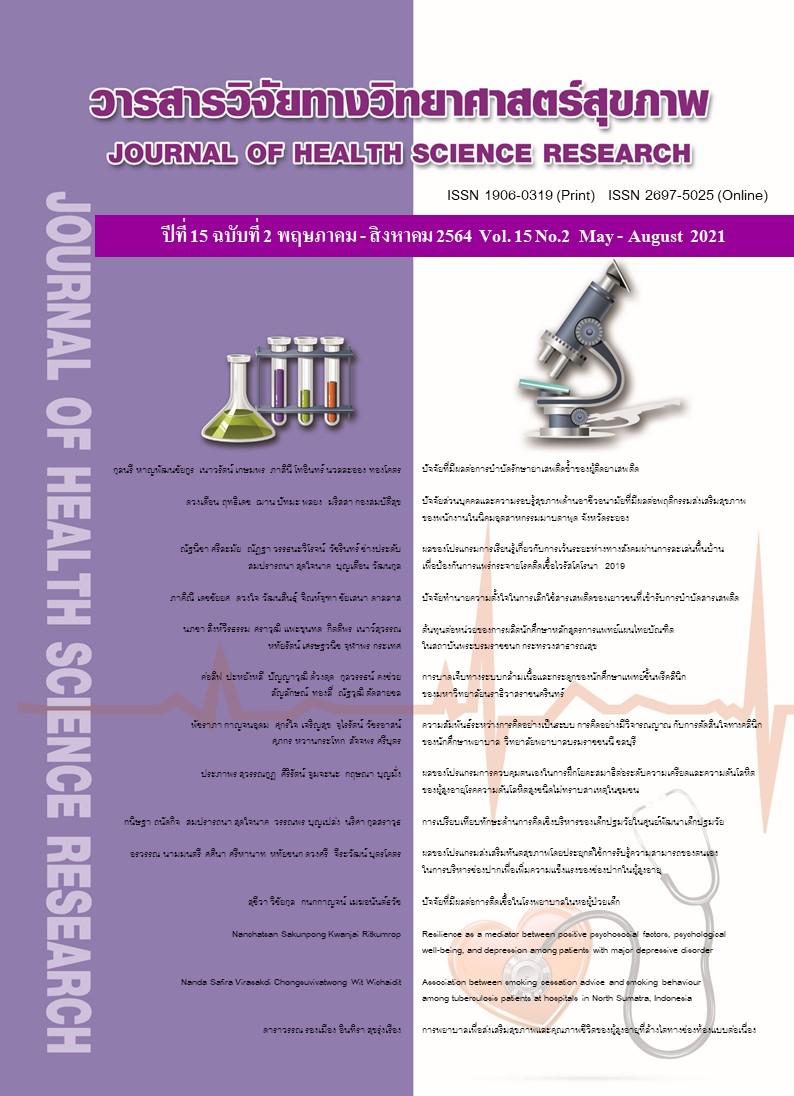การเปรียบเทียบทักษะด้านการคิดเชิงบริหารของเด็กปฐมวัยในศูนย์พัฒนาเด็กปฐมวัย
Main Article Content
บทคัดย่อ
บทนำ : การคิดเชิงบริหารสำคัญอย่างยิ่งสำหรับเด็กปฐมวัย เด็กที่ทักษะด้านการคิดเชิงบริหารดีจะสามารถกำกับตนเองให้เกิดพฤติกรรมที่มุ่งสู่เป้าหมายซึ่งทำให้สามารถบรรลุความสำเร็จได้ทั้งเป้าหมายระยะสั้นและระยะยาว
วัตถุประสงค์การวิจัย : เพื่อศึกษาระดับ และเปรียบเทียบความแตกต่างของทักษะด้านการคิดเชิงบริหารของเด็กปฐมวัย จำแนกตามเพศและอายุ
วิธีการวิจัย : การวิจัยเชิงพรรณนา ตัวอย่าง คือ เด็กปฐมวัย ในศูนย์พัฒนาเด็กปฐมวัยในเขตเทศบาลนครนนทบุรี จากการสุ่มแบบหลายขั้นตอน จำนวน 185 คน เครื่องมือวิจัยคือ แบบประเมินพัฒนาการด้านการคิดเชิงบริหารในเด็กก่อนวัยเรียน มีค่าความเที่ยงระหว่างผู้สังเกต .96 – 1 วิเคราะห์ข้อมูลเปรียบเทียบระดับพัฒนาการด้านการคิดเชิงบริหารจำแนกตามเพศโดยทดสอบค่าที และเปรียบเทียบช่วงอายุโดยวิเคราะห์ความแปรปรวนทางเดียว
ผลการวิจัย : ค่าเฉลี่ยคะแนนพัฒนาการด้านการคิดเชิงบริหารอยู่ในระดับปานกลาง (M=55.22, SD=7.31) เปรียบเทียบค่าเฉลี่ยคะแนนการคิดเชิงบริหารระหว่างเพศชาย (M=54.86, SD=7.70) และ หญิง (M=55.51, SD=7.01) พบว่า ไม่แตกต่างกัน (t=0.60, p=.55) และเมื่อเปรียบเทียบค่าเฉลี่ยของคะแนนการคิดเชิงบริหารตามช่วงอายุ พบว่า ด้านความจำขณะทำงานมีความแตกต่างกันอย่างมีนัยสำคัญทางสถิติ [F (2,182) = 94.95, p=.02] เมื่อวิเคราะห์ค่าความแปรปรวนของคะแนนเฉลี่ยด้านความจำขณะทำงานโดยใช้สถิติ Games-Howell Test พบว่า เด็กช่วงอายุ 3-3.11 ปี และ ช่วงอายุ 5-5.11 ปี มีความแตกต่างกันอย่างมีนัยสำคัญทางสถิติ (p=.02)
สรุปผล : เด็กปฐมวัยควรได้รับการพัฒนาการคิดเชิงบริหารให้ครบทุกด้าน โดยเฉพาะในด้านการวางแผนจัดการและด้านการเปลี่ยนแปลงความคิด
Downloads
Article Details
บทความที่ได้รับการตีพิมพ์เป็นลิขสิทธิ์ของวิทยาลัยพยาบาลบรมราชชนนี จังหวัดนนทบุรี
ข้อความที่ปรากฏในบทความแต่ละเรื่องในวารสารวิชาการเล่มนี้เป็นความคิดเห็นส่วนตัวของผู้เขียนแต่ละท่านไม่เกี่ยวข้องกับวิทยาลัยพยาบาลบรมราชชนนี จังหวัดนนทบุรี และคณาจารย์ท่านอื่น ในวิทยาลัยฯ แต่อย่างใด ความรับผิดชอบองค์ประกอบทั้งหมดของบทความแต่ละเรื่องเป็นของผู้เขียนแต่ละท่าน หากมีความผิดพลาดใด ๆ ผู้เขียนแต่ละท่านจะรับผิดชอบบทความของตนเองแต่ผู้เดียว
เอกสารอ้างอิง
World Health Organization. Early child development-Child health and development. [internet]. 2016 [cited 2021 Mar 13]. Available from:https://www.who.int/maternal_child_adolescent/child/guidelines_improving_early_childhood_development/en/.
McClelland MM, Cameron CE, Duncan R, Bowles RP, Acock AC, Miao A, et al. Predictors of early growth in academic achievement: the head-toes-knees-shoulders task. Front Psycho. 2014;5(1):599. doi: 10.3389/fpsyg. 2014.00599.
Michel T, Magnus B, Lynni VF, Blair CB, The family life project investigators developmental delays in executive function from 3 to 5 years of age predict Kindergarten Academic Readiness. J Learn Disabil. 2017;50(4):359-72. doi: org/10.1177/0022219415619754.
Chutabhakdikul N, Thanasetkorn P, Lertawasdatrakul O, Ruksee N. Tool development and evaluation criteria for assessment of executive function in early childhood [internet]. 2017 [cited 2021 Mar 13]. Available from: http://kb.hsri.or.th. (in Thai).
Seamkhumhom D, Chaiyawut, P, Wanngamwiset, S, Thienphuridej T. Promoting to executive functions in preschool children. Journal of MCU Nakhondhat. 2020;7(10):15-31. (in Thai)
Diamond A. Executive functions. Annu Rev Psycho. 2013;64(1):135-68. doi.org/10. 1146/annurev-psych-113011-143750.
Labnok S, Pongjaturawit Y, Chaimongkol N, Predictors of executive function development in preschool children. Journal Bamrasnaradura Infectious Diseases Institute. 2020;14(1):56-67. (in Thai).
Imnamkhao S, Srichanchai J. Nurse’s role of executive function promotion in early childhood. Journal of MCU Nakhondhat. 2021;8(1):229-44. (in Thai).
Ackerman DJ, Friedman-Krauss AH. Preschoolers’ executive function: Importance, contributors, research needs and assessment Options. Policy Information ETS Res Rep Ser. 2017;1:1-24. doi: 10. 1002/ets2.12148.
Meuwissen AS, Carlson SM. Fathers matter: The role of father parenting in preschoolers’ executive function development. J Exp Child Psycho. 2015; 140:1-15 doi: 10.1016/j.jecp.2015.06.010.
Nicastri M, Giallini I, Amicucci M, Mariani L, Vincentiis MD, Greco A, et.at. Variables influencing executive functioning in preschool hearing‑impaired children implanted within 24 months of age: an observational cohort study. Eur Arch Otorhinolaryngol. 2021;278(8):2733–43. doi:10.1007/500405-020-06343-7.
Thailand Official Statistics Registration Systems. Population census by age [Internet]. 2018 [cited 2021 Jun 3]. Available from: http://stat.dopa.go.th/stat/ statnew/upstat_age_disp.php. (in Thai).
Srisaticharakul B. Introduction of research. 10th ed. Bangkok: Suwiriyasan. 2017. (in Thai).
Thato R. Nursing research: concepts to application. 3rd ed. Bangkok: Chulalongkorn University Press; 2018. (in Thai).
Sukamolson S. Priori and posteriori comparisons for a research study. Academic Journal of Buriram Rajabhat University. 2017;9(2):51-70. (in Thai).
Chano J. Executive functions and early childhood development. Journal of Education Mahasarakham University 2019;13(1):7-17. (in Thai).
Center on the Developing Child at Harvard University. Enhancing and practicing executive function skills with children from infancy to adolescence. [internet]. 2014 [cited 2021 Mar 13]. Available from: https://developingchild. harvard.edu/science/key-concepts/exe cutive-function.
Harvard University. Building the Brain’s “Air Traffic Control” System: how early experiences shape the development of executive function. MA: Center on the Developing Child; 2011.
Seamkhumhom D, Nookong A, Rungamornrat S,
Chutabhakdikul N. Factor related of executive functions in preschool-aged children. Thai Journal of Nursing Council. 2019;34(4):80-94. (in Thai).
Wanless SB, McClelland MM, Lan X, Son S-H, Cameron CE, Morrison FJ, et al. Gender differences in behavioral regulation in four societies: The United States, Taiwan, South Korea, and China. Early Child Res Quart. 2013;28(3):621-33. doi: org/10196/j.eeresg.2013.04.002.
Alloway TP. Passolunghi MC. The relationship between working memory, IQ, and mathematical skills in children. Learn Individ Differ. 2011;21:133-7. doi: org/10.1016-j.lindef.2010.09.013.
Wu M, Liang X, Lu S, Wang Z. Infant motor and cognitive abilities and subsequent executive function. Infant Behav Dev. 2017;49:204-13. doi: 10.1016/ j.infbeh.2017.09.005.
St Clair-Thompson HL. Executive functions and working memory behaviours in children with a poor working memory. Learn Individ Differ. 2011;21(4):409-14. doi: org/10.1016/J. linclif.2011.02.008.
Cortés Pascual A, Moyano Muñoz N, Quílez Robres A. The relationship between executive functions and academic performance in primary education: Review and meta-analysis. Front Psychol. 2019;10:1-8. doi: 10.338 9/fpsyg.2019.01582.


